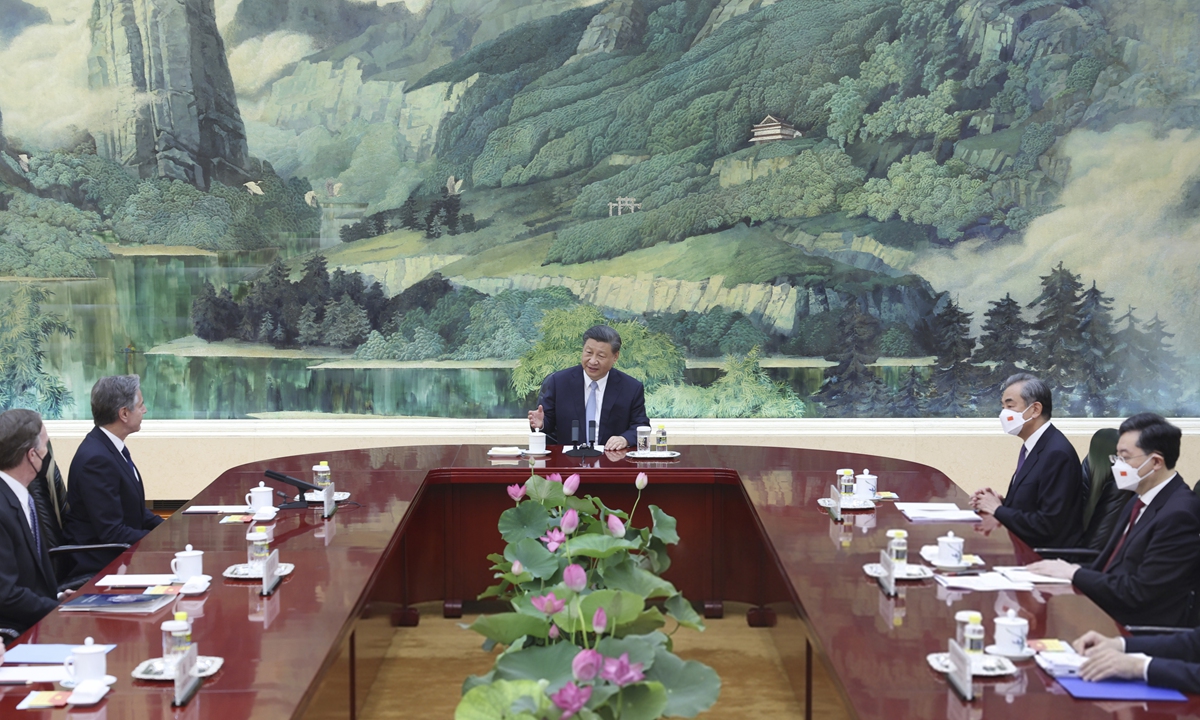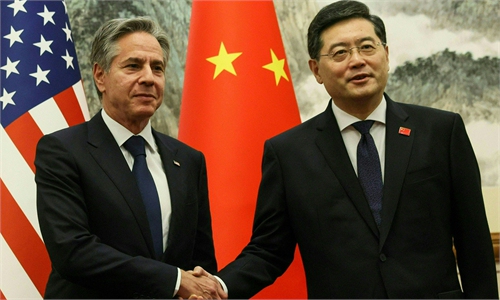
Chinese President Xi Jinping (center) meets with visiting US Secretary of State Antony Blinken in Beijing on June 19, 2023. Blooming lotus ffowers are seen placed in the middle of the meeting table. The Chinese word for "lotus" has similar pronunciation with the word of "peace" and "harmony." Photo: Xinhua
On June 19, Chinese President Xi Jinping met with US Secretary of State Antony Blinken in Beijing, which was the most important and highly anticipated part of Blinken's China visit. Until the last moment, whether Blinken would secure a meeting with President Xi was a topic of great interest in the US media, carrying significant indicators to measure the achievements of Blinken's visit and the level of easing in China-US relations. Therefore, once the meeting was confirmed and the scene of the meeting was released, it immediately became one of the most significant international events of the day. Against the backdrop of the international community's widespread concern over the downward spiral of China-US relations, this meeting has released the expected signal of relief.
Though the meeting was not long, it carried substantial information. President Xi expounded on the principled stance for stabilizing and developing China-US relations, providing strategic and guiding suggestions. President Xi emphasized that the world needs a generally stable China-US relationship, and whether the two countries can find the right way to get along bears on the future and destiny of humanity. The vast expanse of the Earth is big enough to accommodate the respective development and common prosperity of China and the US, Xi pointed out. The Chinese, like the Americans, are dignified, confident and self-reliant people, Xi said, adding that they both have the right to pursue a better life, and the common interests of the two countries should be valued, and their respective success is an opportunity instead of a threat to each other.
These words are full of sincerity and goodwill, while also targeted. Some people in the US view China's development with a narrow mindset of zero-sum game or even negative-sum game, perceiving it as a threat rather than an opportunity. Their biases toward China, catalyzed by the complex political and diplomatic environment in Washington, have become the crux of the twists and turns in China-US relations. In other words, the US' own problems have turned into problems in bilateral relations, which need to be resolved by the US side.
China has consistently demonstrated its strategic clarity to the US, which is a sharp contrast with US side's strategic ambiguity. The three most commonly used adjectives by both sides for their high-level communication are "frank, in-depth and constructive." Clarity represents frankness. We believe that Blinken deeply understands this during his visit. China has thoroughly explained the root causes of the low point in China-US relations, the urgent tasks for both sides, China's intentions and goals for development and revitalization, and the most prominent risks in the bilateral relationship. China does not harbor ill intentions toward the US, but it will definitely counteract any suppressive actions. If the US still has any misunderstandings about China's strategic intentions, then we can only assume that they are deliberate and pretending to be ignorant.
Overall, in a situation with low expectations from various parties and having experienced twists and turns, Blinken's visit to China has achieved some specific consensus, and the communication has been efficient and in-depth. It is worth noting that during the talks, Blinken made some statements that moved toward China's position. For example, he said that the US is committed to returning to the agenda set at the summit between the heads of state in Bali and reiterated US President Joe Biden's commitment of "five noes." Some of Blinken's statements during the press conference held on Monday evening also reflected this point. However, it should be pointed out that the "stability" of China-US relations requires both sides meeting each other halfway, especially for the US to be consistent in both words and deeds.
Even though it is still too early to determine if it was a successful visit, China-US relations made positive progress because of the trip. This is in the interests of the US, China, and even the world, which is also what the international community hopes to see. The world once had unprecedentedly low confidence in the turnaround of China-US relations, but now there are more expectations for the stability of China-US relations.
China and the US have taken a step forward, but it is still far from enough. The key lies in the next steps. It goes without saying that there are still differences between the two countries on many issues. No one expects Blinken's trip to resolve these divergences. Its greater significance lies in the possibility of reversing the highly unhealthy and tense atmosphere in bilateral relations and thus creating conditions for managing and resolving the differences. China's reception of Blinken also showcases China's demeanor as a major power and its sincerity in stabilizing China-US relations and strengthen communication. Previously, the US gave the world the impression that China was unwilling to communicate, but it is clearly not the case.
Some media outlets noticed that the blooming lotus placed at the center of the meeting table between President Xi and Blinken was particularly eye-catching. It is currently the season of lotus blooms, and "lotus" has the same pronunciation in Chinese as "harmony," conveying the expectation of peaceful coexistence and win-win cooperation between China and the US. We hope that after returning to the US, Blinken will comprehensively and objectively convey the information received in China, generating new momentum for stabilizing China-US relations, and never again leaving the impression that the US says one thing and does another.

